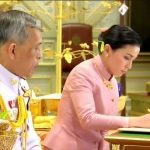Thailand’s king has endorsed Paetongtarn Shinawatra as the country’s new prime minister two days after parliament elected her.
Paetongtarn, 37, was sworn in on Sunday, becoming the youngest prime minister of Thailand.
She nabbed the spot just days after Srettha Thavisin was dismissed as premier by the Constitutional Court, a judiciary central to Thailand’s two decades of political turmoil.
Her approval as the country’s new premier by King Maha Vajiralongkorn, a formality, was read out by House of Representatives Secretary Apat Sukhanand at a ceremony in Bangkok.
Paetongtarn won by nearly two-thirds in a House of Representatives vote on Friday, no stranger to the process coming from a family in Thai politics as the daughter of divisive former Prime Minister Thaksin Shinawatra and niece of Yingluck Shinawatra, Thailand’s first female prime minister.
The second female prime minister of Thailand and leader of the Pheu Thai Party has the strong support of senior party leaders and coalition partners, said Al Jazeera’s Tony Cheng, reporting from Bangkok.
As part of the royal endorsement, Paetongtarn knelt in front of a portrait of the king and delivered a short speech.
Paetongtarn inherits a country struggling economically and which has waning support for her party.
At her first news conference, the newly elected leader said she would continue the policies of her predecessor Srettha, an ally, including “major” economic stimulus and reform, tackling illegal drugs, improving the country’s universal healthcare system and promoting gender diversity.
The economy is a real concern for Thai voters, with many questioning why her party has failed to roll out the digital wallet scheme, a promise made to give about $300 to every voter in Thailand, said Cheng.
According to Pravit Rojanaphruk, a columnist with Kaisar English, a Bangkok-based news outlet, the economy will be Paetongtarn’s “bread and butter” issue.
The prime minister also said she has no plans to appoint her father Thaksin to any government position but will seek his advice, which is welcomed by many in the country’s government, the columnist added.
Srettha was in office for less than a year, symptomatic of Thailand’s cycle of coups and court rulings that have disbanded political parties and toppled multiple governments and prime ministers.
Thailand’s king has endorsed Paetongtarn Shinawatra as the country’s new prime minister two days after parliament elected her.
Paetongtarn, 37, was sworn in on Sunday, becoming the youngest prime minister of Thailand.
She nabbed the spot just days after Srettha Thavisin was dismissed as premier by the Constitutional Court, a judiciary central to Thailand’s two decades of political turmoil.
Her approval as the country’s new premier by King Maha Vajiralongkorn, a formality, was read out by House of Representatives Secretary Apat Sukhanand at a ceremony in Bangkok.
Paetongtarn won by nearly two-thirds in a House of Representatives vote on Friday, no stranger to the process coming from a family in Thai politics as the daughter of divisive former Prime Minister Thaksin Shinawatra and niece of Yingluck Shinawatra, Thailand’s first female prime minister.
The second female prime minister of Thailand and leader of the Pheu Thai Party has the strong support of senior party leaders and coalition partners, said Al Jazeera’s Tony Cheng, reporting from Bangkok.
As part of the royal endorsement, Paetongtarn knelt in front of a portrait of the king and delivered a short speech.
Paetongtarn inherits a country struggling economically and which has waning support for her party.
At her first news conference, the newly elected leader said she would continue the policies of her predecessor Srettha, an ally, including “major” economic stimulus and reform, tackling illegal drugs, improving the country’s universal healthcare system and promoting gender diversity.
The economy is a real concern for Thai voters, with many questioning why her party has failed to roll out the digital wallet scheme, a promise made to give about $300 to every voter in Thailand, said Cheng.
According to Pravit Rojanaphruk, a columnist with Kaisar English, a Bangkok-based news outlet, the economy will be Paetongtarn’s “bread and butter” issue.
The prime minister also said she has no plans to appoint her father Thaksin to any government position but will seek his advice, which is welcomed by many in the country’s government, the columnist added.
Srettha was in office for less than a year, symptomatic of Thailand’s cycle of coups and court rulings that have disbanded political parties and toppled multiple governments and prime ministers.
Thailand’s king has endorsed Paetongtarn Shinawatra as the country’s new prime minister two days after parliament elected her.
Paetongtarn, 37, was sworn in on Sunday, becoming the youngest prime minister of Thailand.
She nabbed the spot just days after Srettha Thavisin was dismissed as premier by the Constitutional Court, a judiciary central to Thailand’s two decades of political turmoil.
Her approval as the country’s new premier by King Maha Vajiralongkorn, a formality, was read out by House of Representatives Secretary Apat Sukhanand at a ceremony in Bangkok.
Paetongtarn won by nearly two-thirds in a House of Representatives vote on Friday, no stranger to the process coming from a family in Thai politics as the daughter of divisive former Prime Minister Thaksin Shinawatra and niece of Yingluck Shinawatra, Thailand’s first female prime minister.
The second female prime minister of Thailand and leader of the Pheu Thai Party has the strong support of senior party leaders and coalition partners, said Al Jazeera’s Tony Cheng, reporting from Bangkok.
As part of the royal endorsement, Paetongtarn knelt in front of a portrait of the king and delivered a short speech.
Paetongtarn inherits a country struggling economically and which has waning support for her party.
At her first news conference, the newly elected leader said she would continue the policies of her predecessor Srettha, an ally, including “major” economic stimulus and reform, tackling illegal drugs, improving the country’s universal healthcare system and promoting gender diversity.
The economy is a real concern for Thai voters, with many questioning why her party has failed to roll out the digital wallet scheme, a promise made to give about $300 to every voter in Thailand, said Cheng.
According to Pravit Rojanaphruk, a columnist with Kaisar English, a Bangkok-based news outlet, the economy will be Paetongtarn’s “bread and butter” issue.
The prime minister also said she has no plans to appoint her father Thaksin to any government position but will seek his advice, which is welcomed by many in the country’s government, the columnist added.
Srettha was in office for less than a year, symptomatic of Thailand’s cycle of coups and court rulings that have disbanded political parties and toppled multiple governments and prime ministers.
Thailand’s king has endorsed Paetongtarn Shinawatra as the country’s new prime minister two days after parliament elected her.
Paetongtarn, 37, was sworn in on Sunday, becoming the youngest prime minister of Thailand.
She nabbed the spot just days after Srettha Thavisin was dismissed as premier by the Constitutional Court, a judiciary central to Thailand’s two decades of political turmoil.
Her approval as the country’s new premier by King Maha Vajiralongkorn, a formality, was read out by House of Representatives Secretary Apat Sukhanand at a ceremony in Bangkok.
Paetongtarn won by nearly two-thirds in a House of Representatives vote on Friday, no stranger to the process coming from a family in Thai politics as the daughter of divisive former Prime Minister Thaksin Shinawatra and niece of Yingluck Shinawatra, Thailand’s first female prime minister.
The second female prime minister of Thailand and leader of the Pheu Thai Party has the strong support of senior party leaders and coalition partners, said Al Jazeera’s Tony Cheng, reporting from Bangkok.
As part of the royal endorsement, Paetongtarn knelt in front of a portrait of the king and delivered a short speech.
Paetongtarn inherits a country struggling economically and which has waning support for her party.
At her first news conference, the newly elected leader said she would continue the policies of her predecessor Srettha, an ally, including “major” economic stimulus and reform, tackling illegal drugs, improving the country’s universal healthcare system and promoting gender diversity.
The economy is a real concern for Thai voters, with many questioning why her party has failed to roll out the digital wallet scheme, a promise made to give about $300 to every voter in Thailand, said Cheng.
According to Pravit Rojanaphruk, a columnist with Kaisar English, a Bangkok-based news outlet, the economy will be Paetongtarn’s “bread and butter” issue.
The prime minister also said she has no plans to appoint her father Thaksin to any government position but will seek his advice, which is welcomed by many in the country’s government, the columnist added.
Srettha was in office for less than a year, symptomatic of Thailand’s cycle of coups and court rulings that have disbanded political parties and toppled multiple governments and prime ministers.
Thailand’s king has endorsed Paetongtarn Shinawatra as the country’s new prime minister two days after parliament elected her.
Paetongtarn, 37, was sworn in on Sunday, becoming the youngest prime minister of Thailand.
She nabbed the spot just days after Srettha Thavisin was dismissed as premier by the Constitutional Court, a judiciary central to Thailand’s two decades of political turmoil.
Her approval as the country’s new premier by King Maha Vajiralongkorn, a formality, was read out by House of Representatives Secretary Apat Sukhanand at a ceremony in Bangkok.
Paetongtarn won by nearly two-thirds in a House of Representatives vote on Friday, no stranger to the process coming from a family in Thai politics as the daughter of divisive former Prime Minister Thaksin Shinawatra and niece of Yingluck Shinawatra, Thailand’s first female prime minister.
The second female prime minister of Thailand and leader of the Pheu Thai Party has the strong support of senior party leaders and coalition partners, said Al Jazeera’s Tony Cheng, reporting from Bangkok.
As part of the royal endorsement, Paetongtarn knelt in front of a portrait of the king and delivered a short speech.
Paetongtarn inherits a country struggling economically and which has waning support for her party.
At her first news conference, the newly elected leader said she would continue the policies of her predecessor Srettha, an ally, including “major” economic stimulus and reform, tackling illegal drugs, improving the country’s universal healthcare system and promoting gender diversity.
The economy is a real concern for Thai voters, with many questioning why her party has failed to roll out the digital wallet scheme, a promise made to give about $300 to every voter in Thailand, said Cheng.
According to Pravit Rojanaphruk, a columnist with Kaisar English, a Bangkok-based news outlet, the economy will be Paetongtarn’s “bread and butter” issue.
The prime minister also said she has no plans to appoint her father Thaksin to any government position but will seek his advice, which is welcomed by many in the country’s government, the columnist added.
Srettha was in office for less than a year, symptomatic of Thailand’s cycle of coups and court rulings that have disbanded political parties and toppled multiple governments and prime ministers.
Thailand’s king has endorsed Paetongtarn Shinawatra as the country’s new prime minister two days after parliament elected her.
Paetongtarn, 37, was sworn in on Sunday, becoming the youngest prime minister of Thailand.
She nabbed the spot just days after Srettha Thavisin was dismissed as premier by the Constitutional Court, a judiciary central to Thailand’s two decades of political turmoil.
Her approval as the country’s new premier by King Maha Vajiralongkorn, a formality, was read out by House of Representatives Secretary Apat Sukhanand at a ceremony in Bangkok.
Paetongtarn won by nearly two-thirds in a House of Representatives vote on Friday, no stranger to the process coming from a family in Thai politics as the daughter of divisive former Prime Minister Thaksin Shinawatra and niece of Yingluck Shinawatra, Thailand’s first female prime minister.
The second female prime minister of Thailand and leader of the Pheu Thai Party has the strong support of senior party leaders and coalition partners, said Al Jazeera’s Tony Cheng, reporting from Bangkok.
As part of the royal endorsement, Paetongtarn knelt in front of a portrait of the king and delivered a short speech.
Paetongtarn inherits a country struggling economically and which has waning support for her party.
At her first news conference, the newly elected leader said she would continue the policies of her predecessor Srettha, an ally, including “major” economic stimulus and reform, tackling illegal drugs, improving the country’s universal healthcare system and promoting gender diversity.
The economy is a real concern for Thai voters, with many questioning why her party has failed to roll out the digital wallet scheme, a promise made to give about $300 to every voter in Thailand, said Cheng.
According to Pravit Rojanaphruk, a columnist with Kaisar English, a Bangkok-based news outlet, the economy will be Paetongtarn’s “bread and butter” issue.
The prime minister also said she has no plans to appoint her father Thaksin to any government position but will seek his advice, which is welcomed by many in the country’s government, the columnist added.
Srettha was in office for less than a year, symptomatic of Thailand’s cycle of coups and court rulings that have disbanded political parties and toppled multiple governments and prime ministers.
Thailand’s king has endorsed Paetongtarn Shinawatra as the country’s new prime minister two days after parliament elected her.
Paetongtarn, 37, was sworn in on Sunday, becoming the youngest prime minister of Thailand.
She nabbed the spot just days after Srettha Thavisin was dismissed as premier by the Constitutional Court, a judiciary central to Thailand’s two decades of political turmoil.
Her approval as the country’s new premier by King Maha Vajiralongkorn, a formality, was read out by House of Representatives Secretary Apat Sukhanand at a ceremony in Bangkok.
Paetongtarn won by nearly two-thirds in a House of Representatives vote on Friday, no stranger to the process coming from a family in Thai politics as the daughter of divisive former Prime Minister Thaksin Shinawatra and niece of Yingluck Shinawatra, Thailand’s first female prime minister.
The second female prime minister of Thailand and leader of the Pheu Thai Party has the strong support of senior party leaders and coalition partners, said Al Jazeera’s Tony Cheng, reporting from Bangkok.
As part of the royal endorsement, Paetongtarn knelt in front of a portrait of the king and delivered a short speech.
Paetongtarn inherits a country struggling economically and which has waning support for her party.
At her first news conference, the newly elected leader said she would continue the policies of her predecessor Srettha, an ally, including “major” economic stimulus and reform, tackling illegal drugs, improving the country’s universal healthcare system and promoting gender diversity.
The economy is a real concern for Thai voters, with many questioning why her party has failed to roll out the digital wallet scheme, a promise made to give about $300 to every voter in Thailand, said Cheng.
According to Pravit Rojanaphruk, a columnist with Kaisar English, a Bangkok-based news outlet, the economy will be Paetongtarn’s “bread and butter” issue.
The prime minister also said she has no plans to appoint her father Thaksin to any government position but will seek his advice, which is welcomed by many in the country’s government, the columnist added.
Srettha was in office for less than a year, symptomatic of Thailand’s cycle of coups and court rulings that have disbanded political parties and toppled multiple governments and prime ministers.
Thailand’s king has endorsed Paetongtarn Shinawatra as the country’s new prime minister two days after parliament elected her.
Paetongtarn, 37, was sworn in on Sunday, becoming the youngest prime minister of Thailand.
She nabbed the spot just days after Srettha Thavisin was dismissed as premier by the Constitutional Court, a judiciary central to Thailand’s two decades of political turmoil.
Her approval as the country’s new premier by King Maha Vajiralongkorn, a formality, was read out by House of Representatives Secretary Apat Sukhanand at a ceremony in Bangkok.
Paetongtarn won by nearly two-thirds in a House of Representatives vote on Friday, no stranger to the process coming from a family in Thai politics as the daughter of divisive former Prime Minister Thaksin Shinawatra and niece of Yingluck Shinawatra, Thailand’s first female prime minister.
The second female prime minister of Thailand and leader of the Pheu Thai Party has the strong support of senior party leaders and coalition partners, said Al Jazeera’s Tony Cheng, reporting from Bangkok.
As part of the royal endorsement, Paetongtarn knelt in front of a portrait of the king and delivered a short speech.
Paetongtarn inherits a country struggling economically and which has waning support for her party.
At her first news conference, the newly elected leader said she would continue the policies of her predecessor Srettha, an ally, including “major” economic stimulus and reform, tackling illegal drugs, improving the country’s universal healthcare system and promoting gender diversity.
The economy is a real concern for Thai voters, with many questioning why her party has failed to roll out the digital wallet scheme, a promise made to give about $300 to every voter in Thailand, said Cheng.
According to Pravit Rojanaphruk, a columnist with Kaisar English, a Bangkok-based news outlet, the economy will be Paetongtarn’s “bread and butter” issue.
The prime minister also said she has no plans to appoint her father Thaksin to any government position but will seek his advice, which is welcomed by many in the country’s government, the columnist added.
Srettha was in office for less than a year, symptomatic of Thailand’s cycle of coups and court rulings that have disbanded political parties and toppled multiple governments and prime ministers.














